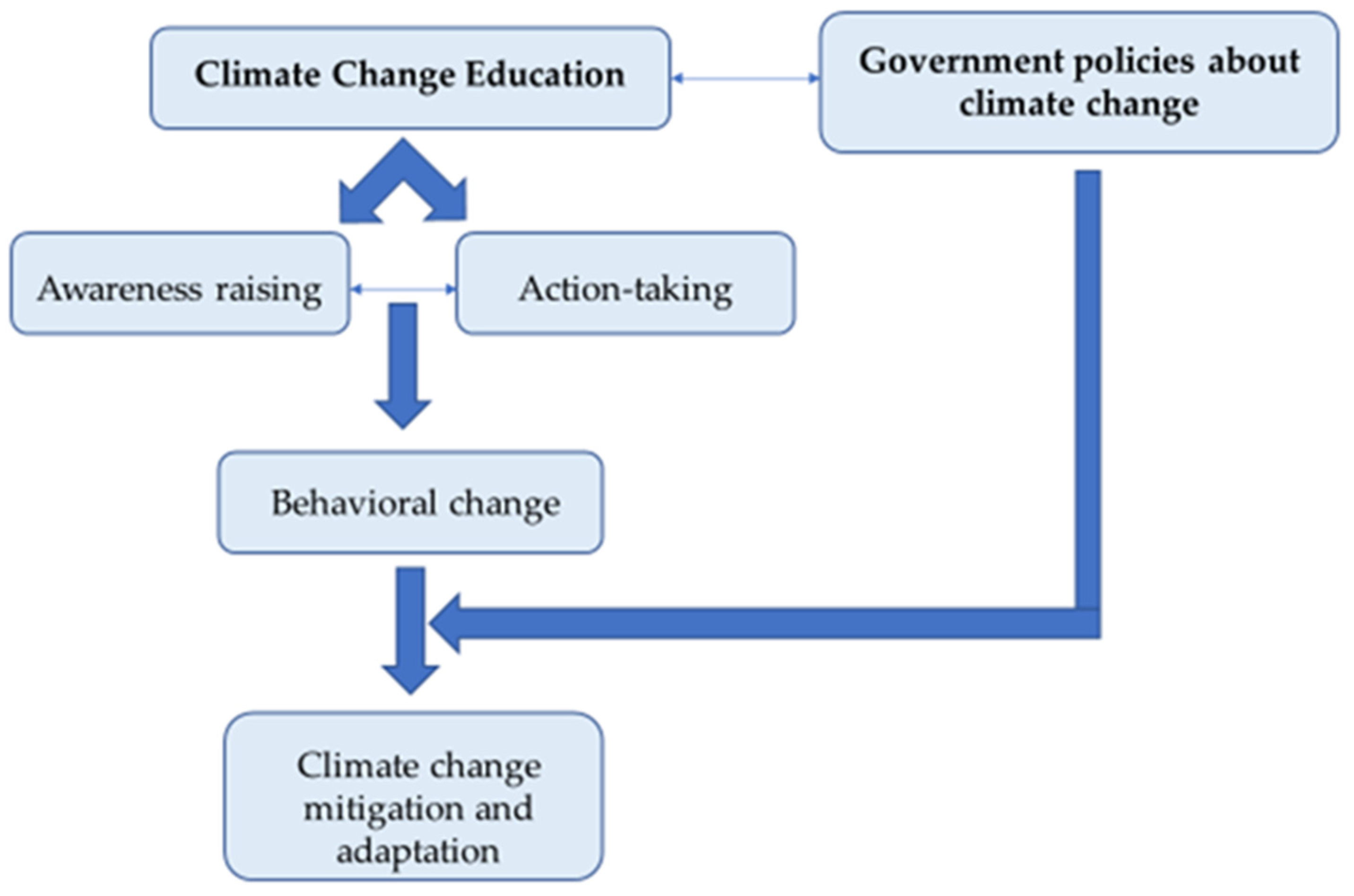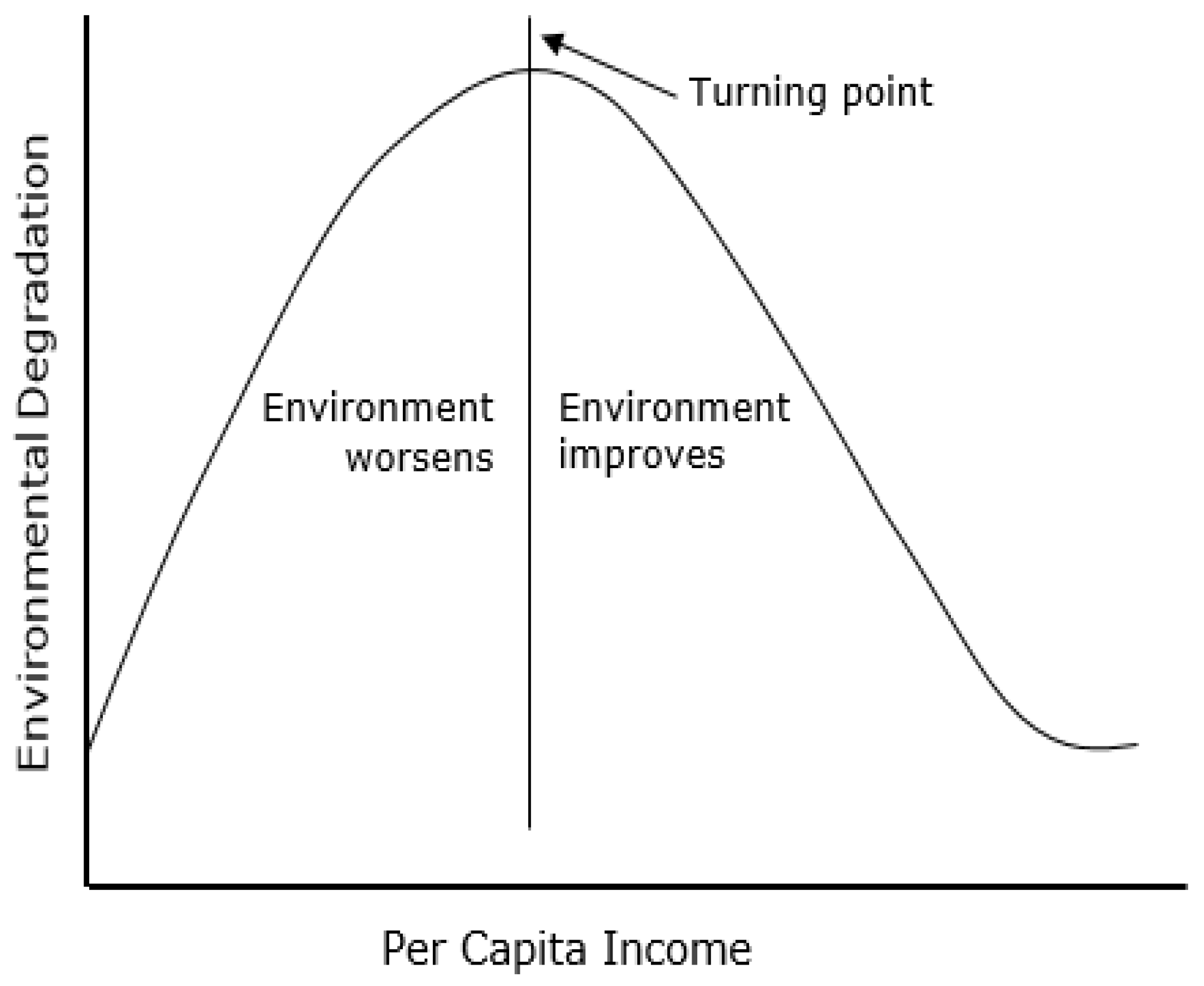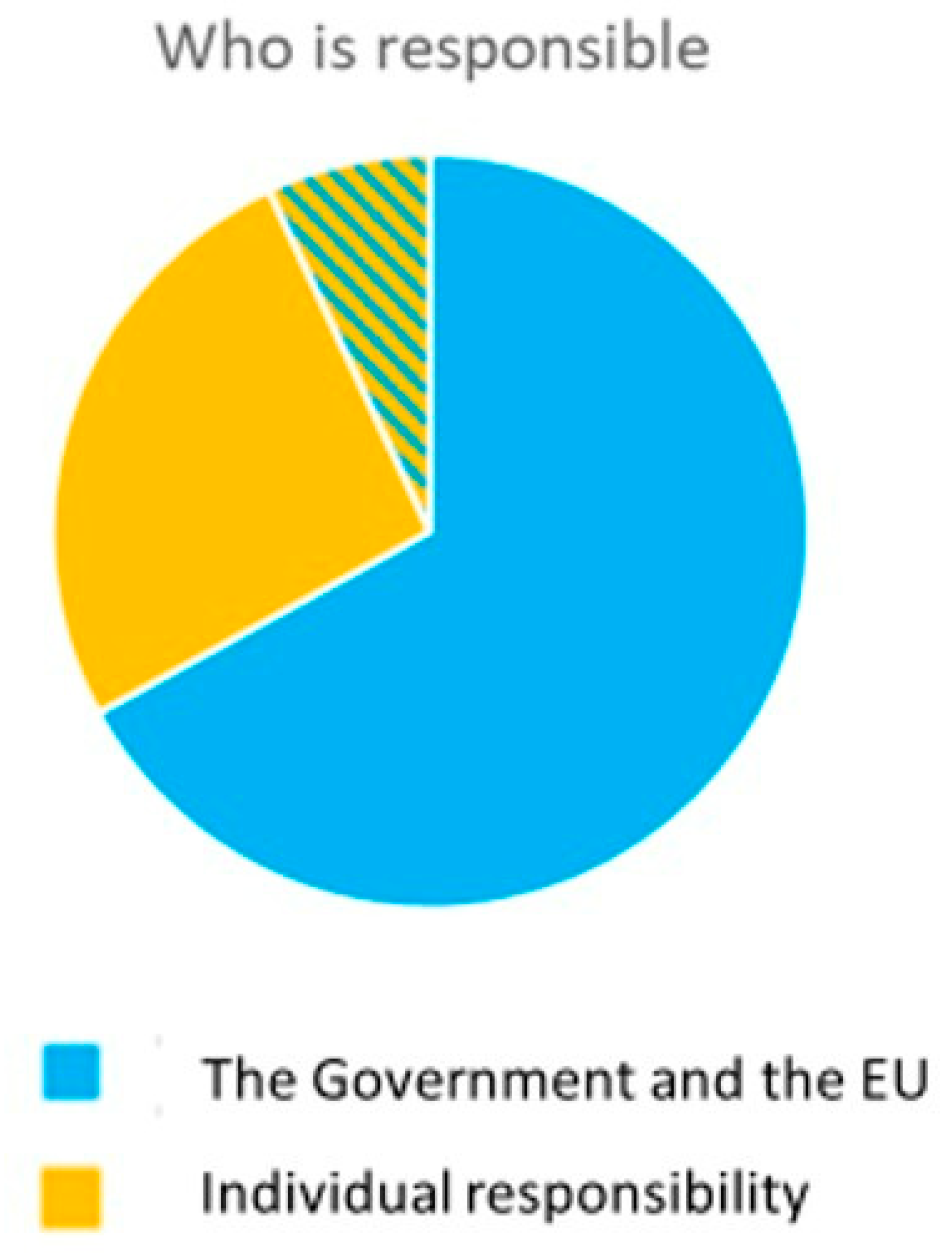Climate Change Education and Preparedness of Future Teachers—A Review: The Case of Greece
Abstract
1. Introduction
2. Conceptual Framework—Climate Change Education and Awareness Raising
3. Citizens and Climate Change—State of the Art Research
3.1. Europe
3.2. Greece
4. Preparedness of Future Teachers in Relation to Climate Change Education—Studies’ Review
4.1. Greece
4.2. Other European Countries
4.3. Countries Outside Europe
5. Discussion
6. Conclusions
Author Contributions
Funding
Informed Consent Statement
Data Availability Statement
Acknowledgments
Conflicts of Interest
References
- Miller, G.T., Jr. Living in the Environment: Principles, Connections and Solutions, 9th ed.; Publications ΙΩΝ: Athens, Greece, 1999; pp. 67–70. (In Greek) [Google Scholar]
- United Nations Framework Convention on Climate Change, FCCC/INFORMAL/84,GE.05-62220(E), 200705. 1992. Available online: https://unfccc.int/resource/docs/convkp/conveng.pdf (accessed on 15 June 2022).
- Karvounis, S.; Georgakellos, D. Environmental Management, Business & Sustainable Development, 1st ed.; Publications Ath.Stamoulis: Athens, Greece, 2003; pp. 267–270. (In Greek) [Google Scholar]
- Paschalidou, A. Climate Change, 1st ed.; Publications Giola: Thessaloniki, Greece, 2021; pp. 3–12, 97–114. (In Greek) [Google Scholar]
- Hardy, J.T. Climate Change: Causes, Effects, and Solutions, 1st ed.; John Wiley & Sons: Hoboken, NJ, USA, 2003. [Google Scholar]
- Georgoulias, A.K.; Akritidis, D.; Kalisoras, A.; Kapsomenakis, J.; Melas, D.; Zerefos, C.S.; Zanis, P. Climate change projections for Greece in the 21st century from high-resolution EURO-CORDEX RCM simulations. Atmos. Res. 2022, 271, 106049. [Google Scholar] [CrossRef]
- IPCC. Climate Change 2021: The Physical Science Basis. Contribution of Working Group I to the Sixth Assessment Report of the Intergovernmental Panel on Climate Change; Masson-Delmotte, V., Zhai, P., Pirani, A., Connors, S.L., Péan, C., Berger, S., Caud, N., Chen, Y., Goldfarb, L., Gomis, M.I., et al., Eds.; Cambridge University Press: Cambridge, UK; New York, NY, USA, 2021; in press. [Google Scholar]
- Gentekakis, Ι.Β. Air Pollution. Impacts, Monitoring and Alternative Technologies, 2nd ed.; Publications Giola: Thessaloniki, Greece, 1999; pp. 157–165. (In Greek) [Google Scholar]
- Garas, G.; Statha, A.; Katsiapi, Ν.; Polkas, L. Climate change, society and environmental ethics. Open Sch. J. Open Sci. 2019, 1, 301–310. (In Greek) [Google Scholar]
- Matsumoto, D. (Ed.) The Cambridge Dictionary of Psychology; Publications Πεδίο: Athens, Greece, 2015; p. 86. [Google Scholar]
- Warnock, M. Moral values. In Values in Education and Education in Values; Halstead, J.M., Taylor, M.J., Eds.; Falmer Press: London, UK, 1996; pp. 45–53. (In Greek) [Google Scholar]
- Takala, M. Environmental awareness and human activity. Int. J. Psychol. 1991, 26, 585–597. [Google Scholar] [CrossRef]
- Tsampoukou-Skanavi, Κ. Environment and Society. A relationship in Constant Evolution, 1st ed.; Publications Kaleidoscopio: Athens, Greece, 2004; pp. 118–123. (In Greek) [Google Scholar]
- Rahimi, M. Public awareness: What climate change scientists should consider. Sustainability 2020, 12, 8369. [Google Scholar] [CrossRef]
- Khatibi, F.S.; Dedekorkut-Howes, A.; Howes, M.; Torabi, E. Can public awareness, knowledge and engagement improve climate change adaptation policies? Discov. Sustain. 2021, 2, 18. [Google Scholar] [CrossRef]
- IPCC. Climate Change 2007: Impacts, Adaptation and Vulnerability. Contribution of Working Group II to the Fourth Assessment Report of the Intergovernmental Panel on Climate Change; Parry, M.L., Canziani, O.F., Palutikof, J.P., van der Linden, P.J., Hanson, C.E., Eds.; Cambridge University Press: Cambridge, UK, 2007; 976p. [Google Scholar]
- Dal, Β.; Öztürk, N.; Alper, U.; Sönmez, D.; Cokelez, A. An analysis of the teachers’ climate change awareness. Athens J. Educ. 2015, 2, 111–122. [Google Scholar] [CrossRef]
- Groves, F.H.; Pugh, A.F. Cognitive illusions as hindrances to learning complex environmental issues. J. Sci. Educ. Technol. 2002, 11, 381–390. [Google Scholar] [CrossRef]
- Ikonomidis, S.; Papanastasiou, D.; Melas, D.; Avgoloupis, S. The anthropogenic ‘greenhouse effect’: Greek prospective primary teachers’ ideas about causes, consequences and cures. J. Sci. Educ. Technol. 2012, 21, 768–779. [Google Scholar] [CrossRef]
- Hills, G. Students’ “untutored” beliefs about natural phenomena: Primitive science or commonsense? Sci. Educ. 1989, 73, 155–186. [Google Scholar] [CrossRef]
- Nunn, P.D.; Aalbersberg, W.; Lata, S.; Gwilliam, M. Beyond the core: Community governance for climate-change adaptation in peripheral parts of Pacific Island Countries. Reg. Environ. Chang. 2014, 14, 221–235. [Google Scholar] [CrossRef]
- Bråten, I.; Strømsø, H.; Salmerón, L. Trust and mistrust when students read multiple information sources about climate change. Learn. Instr. 2011, 21, 180–192. [Google Scholar] [CrossRef]
- Competente, R.J.T. Pre-service teachers’ inclusion of climate change education. Int. J. Eval. Res. Educ. 2019, 8, 119–126. [Google Scholar] [CrossRef]
- Palm, R.; Lewis, G.B.; Feng, B. What causes people to change their opinion about climate change? Ann. Am. Assoc. Geogr. 2017, 107, 883–896. [Google Scholar] [CrossRef]
- Funtowicz, S.; Ravetz, J. Three types of risk assessment: A methodological analysis. In Risk Analysis in the Private Sector; Whipple, C., Covello, V., Eds.; Plenum Press: New York, NY, USA, 1985. [Google Scholar]
- Funtowicz, S.; Ravetz, J. Uncertainty and Quality in Science for Policy; Kluwer: Dordrecht, The Netherlands, 1990; 229p. [Google Scholar]
- Funtowicz, S.; Ravetz, J. Post-normal science: A new science for new times. Sci. Eur. 1990, 266, 20–22. Available online: http://www.andreasaltelli.eu/file/repository/PNSScEur1990_searchabe.pdf (accessed on 25 November 2022).
- Funtowicz, S.; Ravetz, J. Three types of risk assessment and the emergence of post-normal science. In Social Theories of Risk; Krimsky, S., Golding, D., Eds.; Praeger: Westport, CT, USA, 1992; pp. 251–274. [Google Scholar]
- Bray, D.; Storch, H. Climate science: An empirical example of postnormal science. Bull. Am. Meteorol. Soc. 1999, 80, 439–455. [Google Scholar] [CrossRef]
- Stathopoulou, Χ. Conceptual change in physics learning and the role of physics-related personal epistemology. Psychol. J. Hell. Psychol. Soc. 2020, 18, 37–53. [Google Scholar]
- Nicholls, N. Cognitive illusions, heuristics, and climate prediction. Bull. Am. Meteorol. Soc. 1999, 80, 1385–1397. [Google Scholar] [CrossRef]
- Koulaidis, V.; Christidou, V. Models of students’ thinking concerning the greenhouse effect and teaching implications. Sci. Educ. 1999, 83, 559–576. [Google Scholar] [CrossRef]
- Boyes, E.; Stanisstreet, M. The “greenhouse effect”: Children’s perceptions of causes, consequences and cures. Int. J. Sci. Educ. 1993, 15, 531–552. [Google Scholar] [CrossRef]
- Thaker, J.; Howe, P.; Leiserowitz, A.; Maibach, E. Perceived collective efficacy and trust in government influence public engagement with climate change-related water conservation policies. Environ. Commun. 2019, 13, 681–699. [Google Scholar] [CrossRef]
- Groves, F.; Pugh, A. Elementary pre-service teacher perceptions of the greenhouse effect. J. Sci. Educ. Technol. 1999, 8, 75–81. [Google Scholar] [CrossRef]
- Tolppanen, S.; Claudelin, A.; Kang, J. Pre-service teachers’ knowledge and perceptions of the impact of mitigative climate actions and their willingness to act. Res. Sci. Educ. 2021, 51, 1629–1649. [Google Scholar] [CrossRef]
- Jeong, J.S.; González-Gómez, D.; Conde-Núñez, M.C.; Sánchez-Cepeda, J.S.; Yllana-Prieto, F. Improving climate change awareness of preservice teachers (PSTs) through a university science learning environment. Educ. Sci. 2021, 11, 78. [Google Scholar] [CrossRef]
- American Psychological Association. APA Dictionary. Available online: https://dictionary.apa.org/environmental-attitudes (accessed on 25 November 2022).
- Baiardi, D.; Morana, C. Climate change awareness: Empirical evidence for the European Union. Energy Econ. 2021, 96, 105163. [Google Scholar] [CrossRef]
- Tunçel, N.; Buğday, E.B. The impact of environmental concern on consumers’ attitude and intention toward electric vehicles: The role of demographics. In Disruptive Technologies and Eco-Innovation for Sustainable Development; Akkucuk, U., Ed.; Engineering Science Reference, IGI Global: Hershey, PA, USA, 2021; pp. 245–267. [Google Scholar]
- Scruggs, L.; Benegal, S. Declining public concern about climate change: Can we blame the great recession? Glob. Environ. Chang. 2012, 22, 505–515. [Google Scholar] [CrossRef]
- Available online: https://commons.wikimedia.org/wiki/File:Environmental_Kuznets_Curve.png#/media/File:Environmental_Kuznets_Curve.png (accessed on 4 October 2022).
- European Investment Bank. 83% of Greeks Believe That Climate Change and Its Consequences Constitute the Greatest Challenge for Humanity in the 21st Century. Available online: https://www.eib.org/en/press/all/2021-400-83-of-greeks-believe-that-tackling-climate-change-and-its-consequences-is-the-biggest-challenge-of-the-21st-century?lang=el (accessed on 15 June 2022). (In Greek).
- Eurobarometer. Special Eurobarometer 513-Climate Change. (In Greek). Available online: https://webgate.ec.europa.eu/ebsm/api/public/deliverable/download?doc=true&deliverableId=75849 (accessed on 15 June 2022).
- diaNEOsis. Panhellenic Survey on Climate Change: Perceptions, Threats and Challenges for a New Environmental Culture. Company: Metron Analysis. Assignment: Greek Ministry for Climate Change & Civil Protection. 2022. (In Greek). Available online: https://www.dianeosis.org/2022/06/climate-change-poll-executive-summary/ (accessed on 4 October 2022).
- Voskaki, A.; Tsermenidis, K. Public perception of climate risk: The case of Greece. In Proceedings of the European Geosciences Union General Assembly, Vienna, Austria, 17–22 April 2016. [Google Scholar]
- Skanavis, C.; Manolas, E.; Kounani, A.; Fergadis, K. Power plant workers’ knowledge, attitudes and behaviour on climate change. Int. J. Glob. Warm. 2017, 12, 386–413. [Google Scholar] [CrossRef]
- Bruun, O.; Olwig, M.F. Is local community the answer? Asian J. Soc. Sci. 2015, 43, 811–836. [Google Scholar] [CrossRef]
- Greek Ministry of Education and Religious Affairs. Decision 66152/GD4, Curriculum ‘Environment and Education for Sustainable Development’ for Nursery School, Grades 1 to 6 of Primary School and Grades 1, 2 and 3 of Secondary School; Government Gazette 2820/B; National Printing House: Athens, Greece, 2022. [Google Scholar]
- Papadimitriou, V. Prospective primary teachers’ understanding of climate change, greenhouse effect, and ozone layer depletion. J. Sci. Educ. Technol. 2004, 13, 299–307. [Google Scholar] [CrossRef]
- Stylianou, L.; Plakitsi, K. Students misconceptions about the greenhouse effect and climate change by the lens of the Activity Theory. Teach. Phys. Sci. Res. Pract. 2016, 59–60, 88–96. [Google Scholar]
- Ratinen, I.J. Primary Student-Teachers’ Conceptual Understanding of the Greenhouse Effect: A mixed method study. Int. J. Sci. Educ. 2013, 35, 929–995. [Google Scholar] [CrossRef]
- Gavrilakis, C.; Stylos, G.; Kotsis, K.; Goulgouti, A. Environmental literacy assessment of Greek university pre-service teachers. Sci. Educ. Res. Prax. 2018, 61, 49–71. [Google Scholar]
- Winter, V.; Kranz, J.; Möller, A. Climate change education challenges from two different perspectives of change agents: Perceptions of school students and pre-service teachers. Sustainability 2022, 14, 6081. [Google Scholar] [CrossRef]
- Tolppanen, S.; Kärkkäinen, S. The blame-game: Pre-service teachers views on who is responsible and what needs to be done to mitigate climate change. Int. J. Sci. Educ. 2021, 43, 2402–2425. [Google Scholar] [CrossRef]
- Wynes, S.; Nicholas, K. The climate mitigation gap: Education and government recommendations miss the most effective individual actions. Environ. Res. Lett. 2017, 12, 074024. [Google Scholar] [CrossRef]
- Häkkinen, H.; Kangas, H. Suomalaisen Vaikuttavimmat Ilmastoteot [Most Impactful Climate Actions for Finns]; WWF Suomi: Helsinki, Finland, 2012; Available online: https://wwf.fi/mediabank/1882.pdf (accessed on 3 February 2020).
- Vukelić, N.; Rončević, N.; Toljan, S. Student teachers’ willingness to act in the climate change context. Soc. Sci. 2022, 11, 47. [Google Scholar] [CrossRef]
- Dal, Β.; Alper, U.; Özdem-Yilmaz, Y.; Öztürk, N.; Sönmez, D. A model for pre-service teachers’ climate change awareness and willingness to act for pro-climate change friendly behavior: Adaptation of awareness to climate change questionnaire. Int. Res. Geogr. Environ. Educ. 2015, 24, 184–200. [Google Scholar] [CrossRef]
- Boyes, E.; Chuckran, D.; Stanisstreet, M. How do high school students perceive global climatic change: What are its manifestations? What are its origins? What corrective action can be taken? J. Sci. Educ. Technol. 1993, 2, 541–557. [Google Scholar] [CrossRef]
- Liarakou, G.; Athanasiadis, I.; Gavrilakis, C. What Greek secondary school students believe about climate change? Int. J. Environ. Sci. Educ. 2011, 6, 79–98. [Google Scholar]
- Lester, B.T.; Ma, L.; Lee, O.; Lambert, J. Social activism in elementary science education: A science, technology, and society approach to teach global warming. Int. J. Sci. Educ. 2006, 28, 315–339. [Google Scholar] [CrossRef]
- Georgopoulos, A. Environmental Education. Identity Matters, 1st ed.; GUTENBERG: Athens, Greece, 2014; pp. 62–65. [Google Scholar]
- North American Association for Environmental Education. Excellence in Environmental Education—Guidelines for Learning (K-12); NAAEE: Rock Spring, GA, USA, 1999. [Google Scholar]
- Boon, H.J. Pre-service teachers and climate change: A stalemate? Aust. J. Teach. Educ. 2016, 41, 38–63. [Google Scholar] [CrossRef]




Disclaimer/Publisher’s Note: The statements, opinions and data contained in all publications are solely those of the individual author(s) and contributor(s) and not of MDPI and/or the editor(s). MDPI and/or the editor(s) disclaim responsibility for any injury to people or property resulting from any ideas, methods, instructions or products referred to in the content. |
© 2023 by the authors. Licensee MDPI, Basel, Switzerland. This article is an open access article distributed under the terms and conditions of the Creative Commons Attribution (CC BY) license (https://creativecommons.org/licenses/by/4.0/).
Share and Cite
Moshou, H.; Drinia, H. Climate Change Education and Preparedness of Future Teachers—A Review: The Case of Greece. Sustainability 2023, 15, 1177. https://doi.org/10.3390/su15021177
Moshou H, Drinia H. Climate Change Education and Preparedness of Future Teachers—A Review: The Case of Greece. Sustainability. 2023; 15(2):1177. https://doi.org/10.3390/su15021177
Chicago/Turabian StyleMoshou, Hara, and Hara Drinia. 2023. "Climate Change Education and Preparedness of Future Teachers—A Review: The Case of Greece" Sustainability 15, no. 2: 1177. https://doi.org/10.3390/su15021177
APA StyleMoshou, H., & Drinia, H. (2023). Climate Change Education and Preparedness of Future Teachers—A Review: The Case of Greece. Sustainability, 15(2), 1177. https://doi.org/10.3390/su15021177






